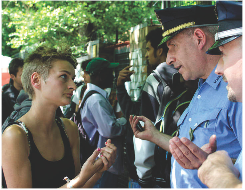European migrant crisis reaches boiling point
Countries around the world are on alert

A girl in Berlin, Germany pleads with police after her school was rushed by immigrants.
October 4, 2015
According to the International Organization for Migration, more than 430,000 migrants have arrived in Europe since January. Most come from Afghanistan, Eritrea or Syria and choose the maritime or land route to Greece, Italy or Spain. The IOM has also recorded over 3,700 deaths since Sept. 10.
Rebecca Ruetz is a clerk who works for the local government in Germany and is responsible for refugees in Simmern and Hunsrück. Since Ruetz works closely with refugees, she provided insight about the next steps in a migrant’s way.
When the refugees first set out they travel from Italy to one of the big inclusion institutions at the Frankfurt-Hahn Airport. From there the government spreads each migrant into districts . It is here that Ruetz’s work begins.
Each refugee has to undergo a recognition procedure where they apply for asylum. The authority of foreigners decide who is an economic (e. g. Albania) or war refugee
(e. g. Syria), since Germany only grants asylum to war refugees. During this time, Ruetz’s duty is to rent apartments or houses for the refugees, which are equipped with basics such as beds, chairs, a kitchen and a table. Since there is a large demand for housing, it usually takes five months for the applicant to receive an answer.
If a migrants’ application is rejected, they are forced to leave the country within two weeks. If moving is financially impossible, the government will offer to help. Normally, 40 percent of the applications submitted are rejected. If the application is approved, the migrant is able to stay in Germany.
Ruetz has built a strong connection with the people directly impacted by this crisis.
“I love my job and if you get in touch with these amazing, warm and open people you would like them too,” Ruetz said. “I think Germany really gains a lot from the inclusion of the migrants.”
Sophia Shaikh, an SCC international student from India, got in touch with local refugees in the U.S., since she is a volunteer at a program known as the Welcome to America project.
“I care about all this and actually everyone should too, but sometimes if you give somebody one finger they want the whole hand,” Shaikh said. “And yes, of course, we have to help more right now, but there should be rules for people that cross the borders or it will get out of control.”
Itzel B. Caire, a student from Mexico, admitted that she does not stay updated on the latest news and feels ashamed about it.
“If I were in the position of a refugee I would not like to be rejected at a border, and honestly no one wants that,” Caire said. “Even if there are physical borders, we shouldn’t let them become mental borders between humans. We are all the same, so actually there shouldn’t be any borders.”

